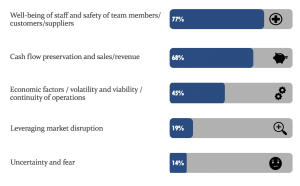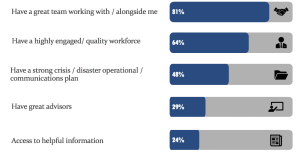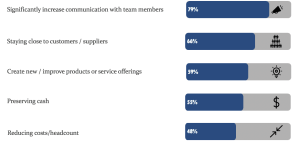Waterstone Insights – Informing and advising today’s leaders
How do today’s business leaders plan to use today’s crisis to build better organizations? By innovating and by investing in people.
By Marty Parker
As the COVID-19 pandemic continues to redefine our working experience, Canadian business leaders have been faced with an extraordinary challenge: define and adapt to a new normal while maintaining operations and protecting the well-being of their teams.
To help leaders best navigate this challenge, Waterstone Human Capital is running a series of pulse surveys to gather evidence-based insights about how leaders are thinking about, responding to, and planning to emerge out of the COVID-19 crisis.
Our first three-question survey was sent to just under 2,000 Canadian executives from Waterstone’s Canada’s Most Admired Corporate Cultures database, and was conducted between April 16 – 23, 2020. It looked at the what was top of mind for business leaders today, how ready leaders felt to deal with the challenges presented by the COVID-19 pandemic and what are their top considerations for moving forward in the new normal and beyond.
What did we find? In the midst of this uncertainty leaders’ primary concern is the well-being of their people, followed by the health of their businesses. Find the full results here.
Leaders’ considerations in today’s new normal
The first question we asked was about pain points or considerations in day-to-day business operations as a result of the COVID-10 pandemic. Participants were asked to select their top three considerations (out of 17 options). Not surprising, the well-being of staff and the safety of team members, customers and/or suppliers was the primary concern among leaders (77 per cent), followed by cashflow preservation and sales/revenue (68 per cent) and economic factors/volatility and viability/continuity of operations (45 per cent).

What is interesting is that one in five respondents selected leveraging leverage market disruption in their top three considerations, while only 14 per cent considered fear or uncertainty as a top consideration.
The Waterstone Insights Leadership Readiness Index
The Waterstone Insights Leadership Readiness Index scored 78 per cent – meaning that when asked to rate their readiness to lead their organizations through the current crisis, leaders’ average score was 7.8 out of 10. This is great news, but what’s most telling are the reasons why leaders say they feel ready – people, engagement and ultimately culture.

Out of 26 options: 81 per cent of respondents said they feel ready because they have a great team working with/alongside them; 64 per cent said it was because they have a highly engaged/quality workforce; and 45 per cent pointed to a strong crisis/disaster operational/communication plan.
The path forward
In challenge there is opportunity and it’s refreshing to know that Canadian business leaders are planning to invest in their people as a key strategy for weathering the current crisis.
When asked what are they doing, or planning to do, that will help their organizations successfully emerge from the COVID-19 crisis, more than three quarters (78 per cent) of respondents indicated they were increasing communications with their teams. This is amazing, considering the communications challenges that go hand-in-hand with having a geographically dispersed workforce and the level and types of communication that have been required to date. Additionally, 66 per cent said they are staying close to customers and suppliers, and 59 per cent are creating or improving products and services.

Interestingly, one third of respondents said they are planning to use this time to train and develop their workforce, while one in five are planning to recruit and upgrade talent and fewer than half were planning to reduce/further reduce headcount.
What does all this mean?
The Canadian leadership community has learned from the recession of 2008-09 and are employing tried and true strategies for weathering tough conditions. Our leaders are determined, committed and optimistic in their abilities to lead through crisis, and are using these challenging times to be better, more innovative, and relevant to their customers
It’s reassuring to see that in the midst of this uncertainty leaders’ primary concern is the well-being of their people, followed by the health of their businesses. That people-first mentality is what’s going to help us move forward.